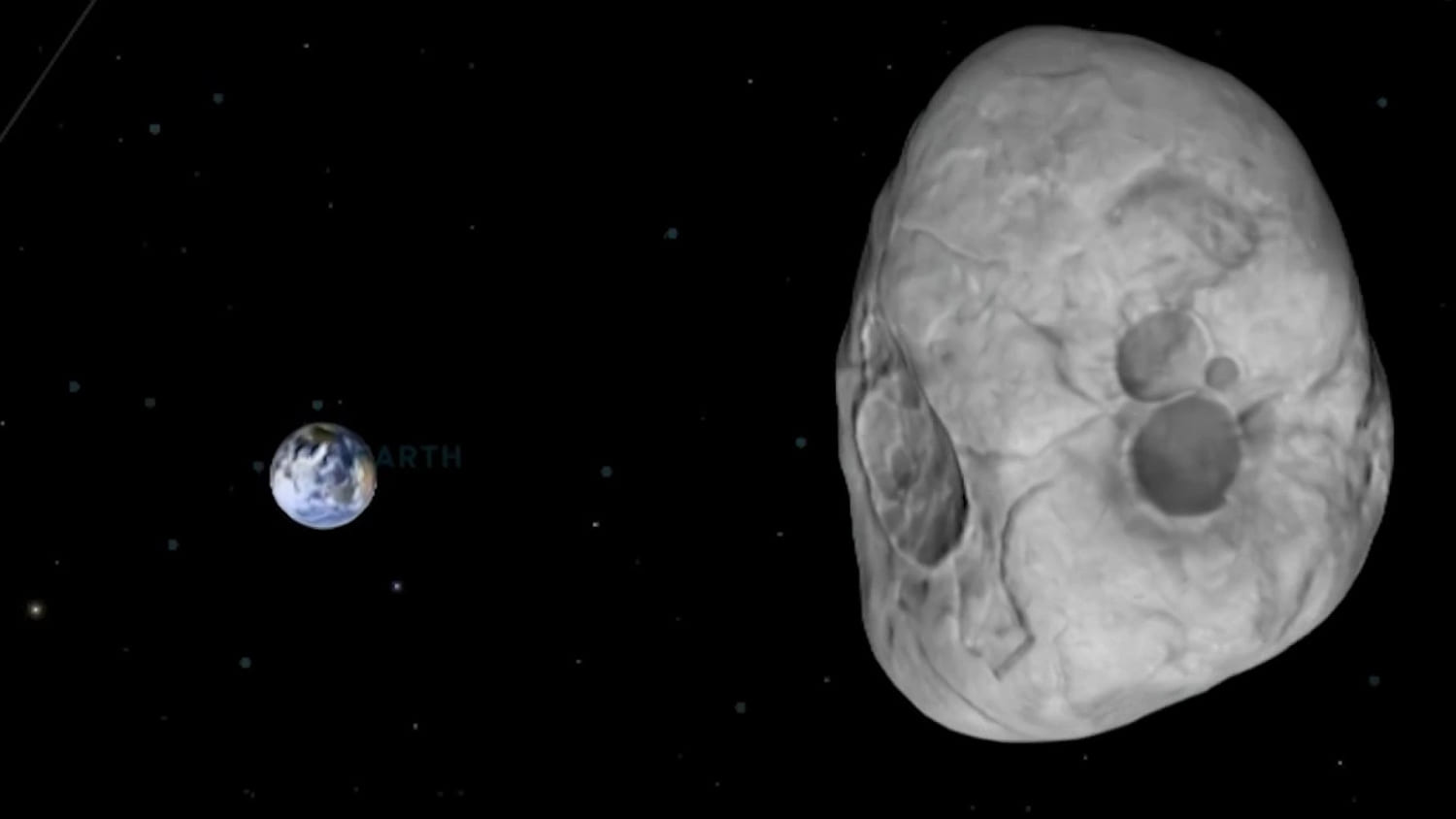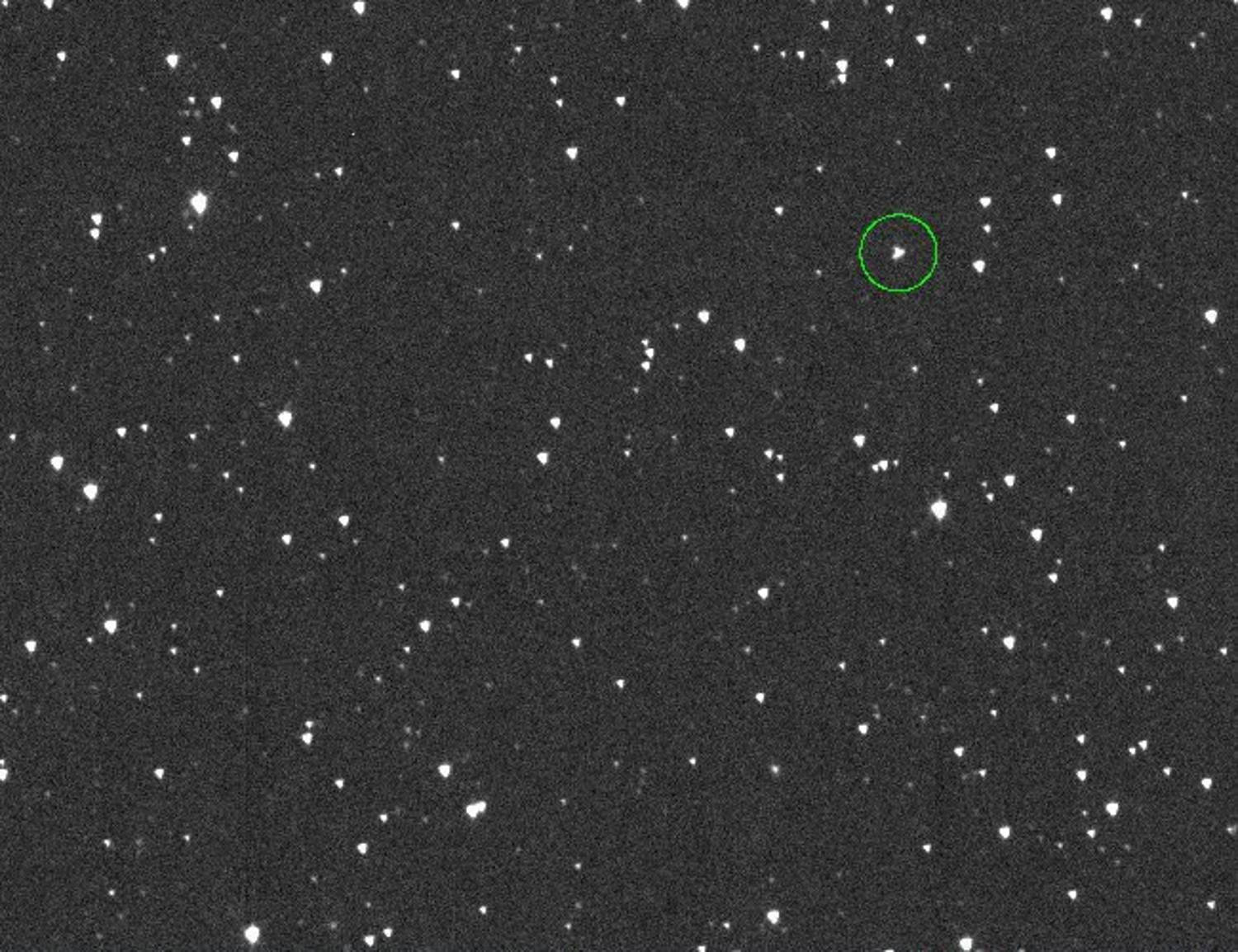NASA's asteroid mission to Apophis: Key for Earth's defense

On Friday the 13th (yes, really) of April 2029, Earth will avoid an apocalyptic event by an astronomical hair's breadth as the asteroid Apophis, streaks by. It will come closer to Earth than the Moon — much closer in fact. It will come between us and the satellites that bring us radio, television and military intelligence.
Apophis is named after an Egyptian god of chaos and evil. If it were to hit Earth, chaos would be the least of our trouble. It’s 1,000 feet across, the size of a football stadium, and it’s going 69,000 miles an hour.
Apophis won’t hit us — at least, we’re pretty certain it won't. But it does offer us an historic opportunity to closely observe it and improve our ability to defend against future asteroid threats.
Unfortunately, our government is blowing the chance.
OSIRIS-REx (Origins Spectral Interpretation Resource Identification Regolith Explorer) has been in space almost 10 years, and it has already returned bits of another asteroid named Bennu. With clever rocket science, NASA redirected OSIRIS-Rex so that it will catch up with Apophis just days after its closest encounter to Earth.
Using the same billion-dollar instrument suite designed for its original asteroid, the spacecraft will be able to closely study the surface, shape and gravity of Apophis. It’s a fantastic deal for the taxpayer: two missions for the price of one, and we already paid for the first one.
Now rechristened OSIRIS-APEX (Origins, Spectral Interpretation, Resource Identification and Security — Apophis Explorer), the project needs only some annual funds to pay its science and engineering team. Led by the University of Arizona, this team will prep the spacecraft for its new encounter.
The money needed to support the team is far less than the cost of one of the fighter jets that Jim Bridenstine used to fly or that Bill Nye worked on as young engineer. But recently, due to overall budget cuts, much of that modest funding was taken away. If those cuts remain in place, the science team of OSIRIS-APEX will have to stand down. Crucial years of planning and coordination will be lost. We won’t learn as much and will be less prepared for future asteroid encounters.
There are a bevy of commercial and private sector options that could help, too. Instead of reaching Apophis after its close flyby of Earth, they could get there months beforehand. This would allow us to map Apophis in its pristine state, before Earth’s gravity potentially alters the asteroid. Comparing the before and after maps would provide clues to how asteroids like Apophis are assembled — vital information if we ever need to deflect one.
NASA also has perfectly good asteroid spacecraft sitting on the shelf. The twin JANUS spacecraft, originally designed for another asteroid mission, were put in storage, their mission cancelled, when their parent spacecraft was delayed. These could be easily repurposed and launched toward Apophis within the next few years. Engaging our private space sector in a dress rehearsal for saving the world, at little cost to NASA, is a no brainer. But budget cuts may prevent these crucial investments.
This is our chance to demonstrate American leadership in the defense of our planet.
While we wait for the confirmation of the next NASA administrator, Congress can take action to ensure that NASA has the funding to, at a minimum, support the OSIRIS-APEX mission. When we have new NASA leadership, we urge them to act decisively on this opportunity to leverage small dollars into big meaningful outcomes for the nation.
There are few clearer justifications for public spending than our common defense, perhaps especially from asteroids. Even in our current divided political environment, we are confident this is a topic that unites us all. In fact, as we were writing this piece, astronomers discovered another heretofore unknown asteroid, “2024 YR4.”
Right now, it’s estimated to have a 1 in 71 (1.4 percent) chance of striking Earth in 2032. That might seem like a small probability, but it’s not zero. Further observations will likely confirm that 2024 YR4 will miss us. But how will the world react, if it is indeed on a collision course? It’s a vivid reminder of what’s at stake for our species.
Kids of all ages love two things: space and dinosaurs. It turns out these two areas of study are intimately connected, or at least, one impacted the other. You know the history: 66 million years ago, a massive asteroid struck Earth, leading to the extinction of the ancient dinosaurs. The ancient dinosaurs did not have a space program. But we do; let’s use it wisely.
Jim Bridenstine served as NASA administrator from 2018-2021. He is the managing partner of The Artemis Group, a strategic consulting firm. The University of Arizona is a client of the company. Bill Nye is a science educator and a New York Times bestselling author. He is Chief Executive Officer of The Planetary Society.
Topics
-
NASA to study "city-killer" asteroid as odds of hitting Earth go up
Astronomers will use the Webb telescope to closely monitor the size and trajectory of an asteroid that has a slim chance of striking Earth in 2032.CBS News - Feb. 10 -

NASA says chance of asteroid hitting Earth in 2032 is 2.3%
NASA is monitoring a 300-foot-long asteroid called the 2024 YR4. The chances of a collision are low but NASA said there is a 2.3% chance that the asteroid will hit Earth in 2032. NBC News’ Kathy ...NBC News - Feb. 13 -

NASA says that, yes, an asteroid buzzing by in 2032 could hit Earth
An asteroid that measures up to 300 feet across could smack into Earth in 2032, and while NASA says the chances of a collision are “extremely low,” the probability has been increasing since the ...NBC News - Feb. 13 -
Key facts about asteroid that could hit Earth in 2032
The head of planetary defense at the European Space Agency discusses 2024 YR4, an asteroid with a small chance of striking Earth eight years from now.CBS News - 6d -
Odds of "city-killer" asteroid hitting Earth in 2032 go up again, NASA says
The asteroid 2024 YR4 has a very small chance of striking Earth when its orbit briefly intersects our planet's in December 2032.CBS News - 1d -
Rocket Parts From Starlink Mission Fall to Earth, Land in Europe
Yahoo News - 21h -
Why the Odds of an Asteroid Striking Earth in 2032 Keep Going Up (and Down)
NASA and European scientists explain how they calculate the probability of the space rock 2024 YR4 impacting our planet, and why it’s not yet time to worry.The New York Times - Feb. 8 -

Will That Asteroid Strike Earth? Risk Level Rises to Highest Ever Recorded.
The threat from space rock 2024 YR4 has surpassed that of Apophis, an asteroid feared by scientists 20 years ago. The danger remains low, but experts are estimating the damage that could be done.The New York Times - 1d -

Asteroid hurtling toward Earth? Odds for impact keep increasing
The chance of it actually having an impact is still quite slim.The Hill - 1d
More from The Hill
-

White House on hockey game: We look forward to US beating soon-to-be-51st-state
White House Press Secretary Karoline Leavitt on Thursday jabbed at Canada as “our soon-to-be 51st state” ahead of a hockey match between the U.S. men’s national team and their neighbors to the ...The Hill - 37m -

Musk says X Community Notes increasingly 'gamed by governments & legacy media'
Elon Musk on Thursday said he going to "fix" his social media platform's X Community Notes feature, claiming without evidence that the feature is being "gamed" by governments and legacy media." ...The Hill - 38m -

Is America preparing to abandon NATO and Europe?
We live in an era of multipolarity, where American hegemony is contested, and the assumptions that underpinned NATO’s longevity are eroding.The Hill - 41m -

Senate confirms Kash Patel to lead FBI
The Senate on Thursday confirmed Kash Patel to serve as the head of the FBI, approving a pick with a string of controversial statements who has been accused by Democrats of directing a purge of ...The Hill - 44m -

Only one Oscar-nominated movie passes 'climate Bechdel test:' report
The vast majority of Academy Award-nominated movies do not acknowledge climate change or environmental issues, despite those issues being increasingly present in mainstream blockbusters, according ...The Hill - 44m
More in Politics
-

White House on hockey game: We look forward to US beating soon-to-be-51st-state
White House Press Secretary Karoline Leavitt on Thursday jabbed at Canada as “our soon-to-be 51st state” ahead of a hockey match between the U.S. men’s national team and their neighbors to the ...The Hill - 37m -

Musk says X Community Notes increasingly 'gamed by governments & legacy media'
Elon Musk on Thursday said he going to "fix" his social media platform's X Community Notes feature, claiming without evidence that the feature is being "gamed" by governments and legacy media." ...The Hill - 38m -
Senate confirms Kash Patel as FBI director in 51-49 vote
The Senate confirmed Kash Patel to serve as director of the FBI, approving a key ally of President Trump to lead the bureau.CBS News - 41m -
Senate confirms Kash Patel as FBI director in 51-49 vote
The Senate confirmed Kash Patel to serve as director of the FBI, approving a key ally of President Trump to lead the bureau.CBS News - 41m -

Is America preparing to abandon NATO and Europe?
We live in an era of multipolarity, where American hegemony is contested, and the assumptions that underpinned NATO’s longevity are eroding.The Hill - 41m
